

The importance and recognition that cooperatives have been having, because of their potential to generate opportunities for human development, justifies the studies that can be carried out from different fields on them, in order to deepen their understanding as social and organizational phenomena. This article presents an analysis of cooperatives from the perspective of agency theory, an approach that provides conceptual and methodological value for the research and management of organizations. It is argued that given the characteristics, principles and values on which cooperatives are based, they do not favor or stimulate the emergence of agency problems; which contributes to the management of these organizations to enhance their capacity to contribute to the achievement of the Sustainable Development Goals.